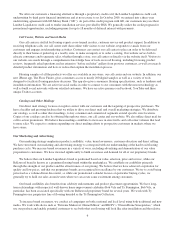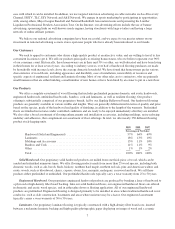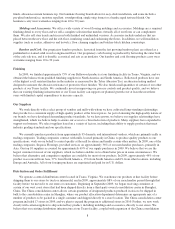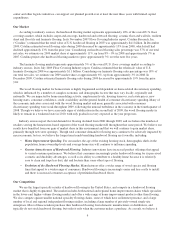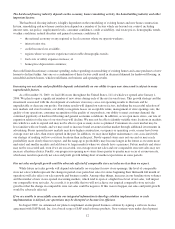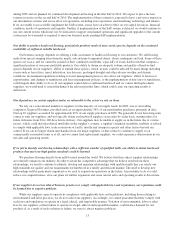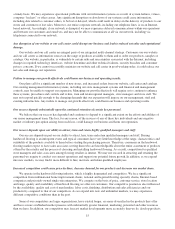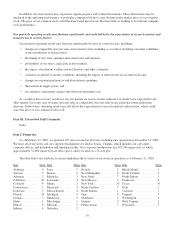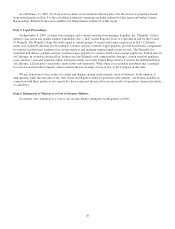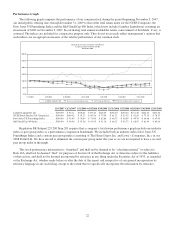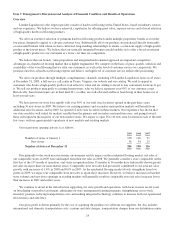Lumber Liquidators 2009 Annual Report Download - page 22
Download and view the complete annual report
Please find page 22 of the 2009 Lumber Liquidators annual report below. You can navigate through the pages in the report by either clicking on the pages listed below, or by using the keyword search tool below to find specific information within the annual report.that are superior to ours or produce similar products at a lower cost, or adapt more quickly to new technologies or evolving
customer requirements than we do. Intense competitive pressures from one or more of our competitors could cause price
declines, decrease demand for our products and decrease our market share.
Hardwood flooring may become less popular as compared to other types of floor coverings in the future. For example,
our products are made using various hardwood species, including rare exotic hardwood species harvested from rainforests,
and concern over the environmental impact of tree harvesting could shift consumer preference towards synthetic or inorganic
flooring. In addition, hardwood flooring competes against carpet, vinyl sheet, vinyl tile, ceramic tile, natural stone and other
types of floor coverings. If consumer preferences shift towards types of floor coverings other than hardwood flooring, we
may experience decreased demand for our products.
All of these competitive factors may harm us and reduce our net sales and profits.
Our success depends on the continued effectiveness of our advertising strategy.
We believe that our past success was achieved in part through our successful investment in local and national
advertising. We typically locate our stores in industrial or commercial areas that have lower rents than traditional retail
locations, but that are generally set some distance from population centers and downtown urban areas. To support this real
estate strategy, we have used extensive advertising to encourage customers to drive to our stores. We may need to increase
our advertising expense to support our business strategy in the future. In addition, we continue to transition our toll-free
telephone number from 1-800-FLOORING, which we lease under a contract with indefinite renewal rights, to
1-800-HARDWOOD, the rights to which we own. We may experience increased costs until the transition is complete or in
the event that our existing lease is terminated. If our advertisements fail to draw customers in the future, or if the cost of
advertising or other marketing materials increases significantly, we could experience declines in our net sales and operating
results.
Failure to maintain relevant product endorsement agreements and product placement arrangements could harm our
reputation and cause our net sales to deteriorate.
We have established relationships with well-known and respected home improvement celebrities to evaluate, promote
and help establish with consumers the high-quality nature of our products. If these individuals were to stop promoting our
products, if we were unable to renew our endorsement contracts with them or if we could not find other endorsers of a similar
caliber, our net sales and reputation could be harmed. Similarly, any actions that persons endorsing our products may take,
whether or not associated with our products, which harm their or our reputations could also harm our brand image with
consumers and our reputation, and cause our net sales to deteriorate. We also have a number of product placement
arrangements with home improvement-related television shows. We rely on these arrangements to increase awareness of our
brands, and to enable potential customers to see both what our flooring will look like after installation and the relative ease
with which it can be installed. Any failure to continue these arrangements could cause our brands to become less well-known
and cause our net sales to deteriorate.
We have entered into a number of lease agreements with companies controlled by our founder and largest stockholder,
and this concentration of leases may pose certain business risks.
As of December 31, 2009, we lease our Toano facility, which includes a store location, and 24 of our other store
locations from entities owned, in whole or in part, by Tom Sullivan. Although our percentage of total stores leased from such
entities has decreased over the last few years, this concentration of leases subjects us to risk in the event action or inaction by
Tom or such entities impacts our leasehold interests in the locations.
We may not be able to adequately protect our intellectual property, which could harm the value of our brands and harm
our business.
Our intellectual property is material to the conduct of our business. Our ability to implement our business plan
successfully depends in part on our ability to further build brand recognition using our trademarks, service marks and other
proprietary intellectual property, including our name and logo and the names and logos of our brands. If our efforts to protect
our intellectual property are inadequate, or if any third party infringes on or misappropriates our intellectual property, the
value of our brands may be harmed, which could adversely affect our business and might prevent our brands from achieving
or maintaining market acceptance. We may also encounter claims from prior users of similar intellectual property in locales
where we operate or intend to operate. This could harm our image, brand or competitive position and cause us to incur
significant penalties and costs.
16


